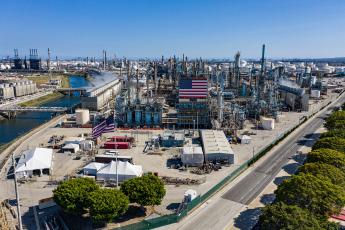AFPM applauds House passage of H.R. 1435 to protect consumers from higher costs of California vehicle bans
American Fuel & Petrochemical Manufacturers (AFPM) President and CEO Chet Thompson today applauded the bipartisan passage of H.R. 1435, the Preserving Choice in Vehicle Purchases Act, from the House of Representatives. Chet testified before the House Energy & Commerce Committee in favor of H.R. 1435 earlier this summer.
EPA’s new proposals to regulate pyrolysis oil will hurt America’s recycling future
Pyrolysis oil allows petrochemical manufacturers and recyclers to reduce the need for virgin petroleum-based feedstocks. Our industries cannot reap the benefits of advanced recycling without being able to take advantage of the substance’s broad uses, especially as a feedstock to make building blocks for new plastics.
AFPM: Reciprocal switching needed to address lack of freight rail competition & years of poor service
Today, Rob Benedict, AFPM Vice President of Petrochemicals and Midstream, issued the following statement in response to a unanimous proposal from the U.S. Surface Transportation Board that would allow for reciprocal switching within the U.S. freight rail system in order to address inadequate service.
EPA draft strategy to prevent plastic pollution needs revision
AFPM welcomes the Environmental Protection Agency’s (EPA’s) efforts in developing a Draft National Strategy to Prevent Plastic Pollution, but consistent with comments submitted to the Agency, we urge a revision of their strategy. To prevent plastic pollution, we encourage EPA to embrace policies that enable, not hinder, a circular economy for plastics where we use a range of technologies and strategies to recover post-consumer plastic and transform it back into usable materials.
AFPM statement on the expiration of the CFATS program
"AFPM is extremely disappointed that the Chemical Facility Anti-Terrorism Standards (CFATS) program was allowed to expire and strongly urges the Senate to pass H.R. 4470 as soon as possible so that our members can resume their longstanding, collaborative relationship with the Department of Homeland Security (DHS) via the CFATS program. Our industries remain committed to providing the best security possible while the program’s regulations remain unauthorized.."
AFPM statement and letter in support of House bills to stop government vehicle bans, attempts to electrify the RFS
“Just as we were proud to testify in support of these bills last month, AFPM is proud to support the legislation being marked up today...As members review these bills carefully, appreciating exactly what they do and do not do, the choice to support them should be obvious, especially for those with fuel and petrochemical manufacturing facilities in their districts.” – Chet Thompson, AFPM President & CEO
Tackling the problem of plastic waste: Ron Abbott, Ph.D.
AFPM sat down with Dr. Ron Abbott, Ph.D., the Sustainability Technology Manager at Chevron Phillips Chemical. A 31-year veteran of the company and holder of 26 patents, Dr. Abbott is responsible for technical programs that advance long-term global sustainability objectives, like advanced recycling. Dr. Abbott was recently featured in AFPM’s recent “Recycling Reimagined” video.
What they’re saying: Call EPA's GHG proposal what it is… a de facto ban on ICE vehicles
People and outlets across the ideological spectrum—even those favoring EPA’s proposal—see the end game clearly: it’s a de facto ban on internal combustion engine vehicles and, by extension, the American-made liquid fuels they run on.
Three things to keep in mind re. EPA’s effort to ban new gas and diesel vehicles
More than 90% of American households own a car, so EPA’s proposal to ban the vast majority (about 70%) of new gasoline and diesel vehicles in less than 10 years is going to affect almost every one of us. It will set the terms for what cars and trucks we can even consider purchasing in the years ahead, and it will certainly affect those vehicle price tags; It will have massive repercussions across the U.S. economy and supply chains; It could upend and challenge U.S. energy security and potentially the reliability of our electricity.









